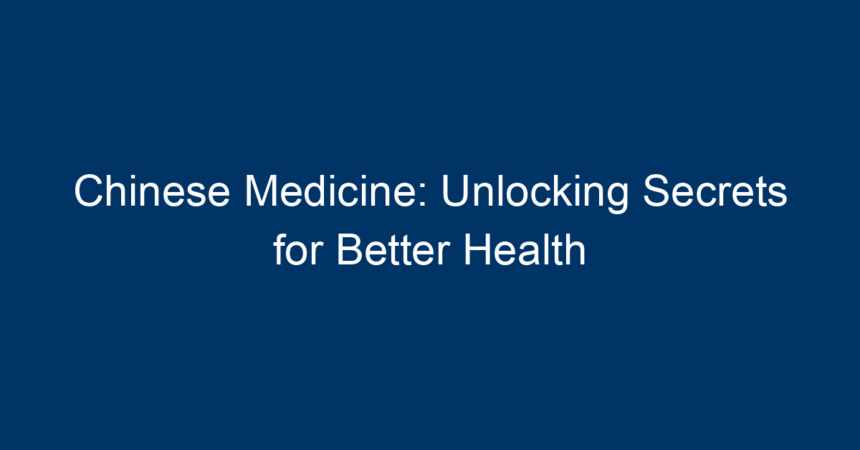In a fast-paced modern world where instant solutions often overshadow traditional wisdom, the ancient practice of Chinese medicine remains a beacon of holistic healing. Rooted in over 2,500 years of history, this medical system offers profound insights into maintaining balance and promoting lasting health. Whether you’re seeking relief from chronic conditions or just looking to enhance your overall well-being, exploring the secrets of Chinese medicine can be a transformative journey.
Understanding Chinese Medicine
The Philosophy Behind Chinese Medicine
At its core, Chinese medicine is based on the principles of balance and harmony. The fundamental belief is that the body is a microcosm of the universe, and maintaining equilibrium between various forces—Yin and Yang—is essential for good health. Yin represents cooling, calm, and passive energies, while Yang embodies warmth, excitement, and active energies. When these forces are in balance, the body thrives. When they are out of balance, illness can occur.
Key Components of Chinese Medicine
- Qi (Chi): Often referred to as "life energy," Qi flows through the body along pathways known as meridians. Blockages or deficiencies in Qi can lead to health issues.
- Yin and Yang: Understanding how these two opposing forces interact within the body helps practitioners identify and address imbalances.
- Five Elements: This system includes Wood, Fire, Earth, Metal, and Water, each associated with different organs and emotions. Recognizing how these elements relate to one another aids in diagnosis and treatment.
Techniques in Chinese Medicine
Acupuncture
One of the most recognized forms of Chinese medicine, acupuncture involves inserting thin needles at specific points on the body to stimulate the flow of Qi. Studies have shown it can alleviate pain, reduce stress, and even improve sleep quality. The targeted activation of meridian points helps release blocked energy and promotes overall well-being.
Herbal Medicine
Chinese herbal remedies, a cornerstone of Chinese medicine, utilize the healing properties of various plants, minerals, and animal products. Formulated into teas, capsules, or powders, these remedies are tailored to individual needs. Common herbs include Ginseng for energy, Ginger for digestion, and Goji Berries for immune support. A qualified practitioner can create a personalized formula targeting your specific health concerns.
Qigong and Tai Chi
These mind-body practices combine physical movement, meditation, and controlled breathing to cultivate and balance Qi. Qigong focuses on gentle movements and breathing techniques to enhance energy flow, while Tai Chi is more martial in form, promoting agility and strength. Both practices improve flexibility, reduce stress, and elevate overall health.
Dietary Therapy
Chinese dietary therapy emphasizes the significance of food in health. Foods are categorized by their energetic qualities and effects on the body. Eating with the seasons and aligning your diet with your body’s needs can prevent illness. For instance, warming foods like ginger in winter and cooling foods like watermelon in summer help maintain balance.
Benefits of Chinese Medicine
Holistic Approach
Unlike conventional medicine, which often addresses symptoms in isolation, Chinese medicine takes a holistic approach, considering emotional, physical, and environmental factors in diagnosis and treatment. This comprehensive understanding fosters a deeper healing process, addressing root causes instead of merely alleviating symptoms.
Chronic Disease Management
Many people turn to Chinese medicine for chronic conditions that may not respond well to conventional treatments. Conditions like arthritis, migraines, and digestive disorders often see significant improvements with acupuncture and herbal therapies. Integrating these methods can enhance the body’s natural healing processes and provide long-term relief.
Stress Reduction and Mental Health
Stress is a modern epidemic, and Chinese medicine offers effective strategies for managing anxiety and enhancing mental clarity. Techniques such as acupuncture, meditation, and Qigong promote relaxation, reduce cortisol levels, and improve mood. The focus on balance helps cultivate resilience against mental health challenges.
The Integration of Chinese and Western Medicine
Complementary Practice
As Chinese medicine gains recognition worldwide, there’s a growing trend towards integrated healthcare. Combining Eastern and Western methods allows for a more comprehensive approach to treating illnesses. Practitioners can work together to create cohesive treatment plans, enhancing recovery rates and patient satisfaction.
Research and Validation
Modern scientific research continues to support many principles and practices of Chinese medicine. Studies have shown the effectiveness of acupuncture for pain management, anxiety relief, and improving quality of life. Ongoing research into herbal remedies and their active compounds is also shedding light on their therapeutic potential.
Taking Action: Incorporating Chinese Medicine into Your Life
-
Consult a Certified Practitioner: Before beginning any treatment, it’s essential to consult a qualified Chinese medicine practitioner who can conduct a thorough assessment and recommend personalized therapies.
-
Explore Acupuncture: Consider trying acupuncture for any specific ailments or general wellness. Many find immediate relief from various physical and emotional stresses.
-
Incorporate Herbs: Research herbal supplements that may complement your health goals. Always consult a professional to ensure safety and effectiveness.
-
Adopt Qigong or Tai Chi: Start practicing these gentle movements to enhance your physical health and mental well-being. Local classes or online tutorials can provide guidance.
- Evaluate Your Diet: Consult with a practitioner to assess your dietary habits. Incorporate foods that harmonize with the seasons and your body’s needs.
Conclusion: Unlocking Better Health with Chinese Medicine
In understanding Chinese medicine, we unlock a treasure trove of knowledge that can dramatically enhance our health and well-being. Whether through acupuncture, herbal remedies, Qigong, or dietary therapy, the systems of this ancient practice offer numerous avenues for healing and balance. By integrating these age-old secrets into your life, you can take proactive steps toward achieving harmony—physically, mentally, and emotionally. As always, collaboration with qualified health practitioners is key to navigating this journey effectively. Embrace the wisdom of Chinese medicine and discover a path to better health today!




